Corey Redekop's Blog, page 37
August 11, 2012
Time for the publicity juggernaut to start up again
Well, it's been awhile, but after much, much, much laziness on my part (catching up on Lost turned out to be a real timesuck), I have finally got the second novel done somewhat to my liking. Which is fairly lucky, since it comes out in less than two months.
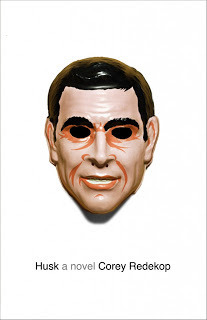 Husk final cover, designed by David Gee
Husk final cover, designed by David Gee
Yes, Husk (click the link for description) is on its way to terrorize bookstores with its ridiculous tale of a zombie with glimmers of morality. Meaning that yes, he does eat a fair amount of people (a zombie novel without cannibalism is like a vegetarian who still eats fish; completely wrongheaded on the concept), but at least he feels conflicted about it.
I've decided to branch out and start an official author page, which you can find here. Already I've posted a few entries on my thoughts concerning zombies, and I'll continue to focus most of my energies on keeping the site filled with current information. Expect it to fill quite rapidly with reviews and events, and I'll be using it to promote further writings and projects down the road. I've also begun a public Facebook page for the novel, which I do hope you'll all check out and join (with the possibility of a free copy up for grabs to all members). I'll keep up my reviews here from time to time, but very likely in a reduced capacity for the foreseeable future.
Already, the buzz is building. Husk has been noted as a hot Fall release by Quill & Quire , and Russell Smith gave it a muted mention in one of his Globe and Mail columns (the title's not there, but I'm fairly certain I'm the only CanLit author with a zombie novel on the horizon, unless Alice Munro has decided to finally publish her long-awaited Lives of Undead Girls and Decomposing Women). I've also been lucky enough to cajole remarkable blurbs from some of my favourite authors (Andrew Pyper, Andrew Kaufman, and Peter Darbyshire, a trio that proves CanLit ain't all about prairie winters and hardscrabble lives), which you can find on my author website.
I've been contacting bloggers and websites with a bent for the horrifically unusual or the unusually horrific to get some early review coverage. If you know of any that get a fairly wide readership, don't hesitate to contact me with the details. I've also been working on the launch in my current habitat in Fredericton, NB, and will get those details finalized ASAP.
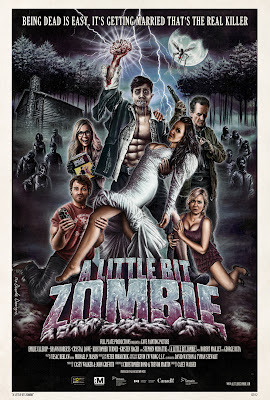 Best of all, I've been accepted to two prestigious Canadian literary festivals for autumn 2012. In late September, I'll be travelling to Manitoba to participate in two events at the Thin Air Winnipeg International Writers Festival. One will be in Winnipeg proper (date and time TBA), and the other (on the evening of Sept. 21) will be a special event in Brandon, MB, where I'll be having a reading of Husk followed by the local premiere of the new Canadian horror comedy
A Little Bit Zombie
. This film was actually financed in large part through crowdsourcing, and has garnered a fair amount of good reviews as it travels the festival circuit. Needless to say, I'm quite stoked about pairing up my novel with this by-all-accounts very silly and very gory little slice of Canucksploitation. Should be a great evening, and a great overall time back in the prairies.
Best of all, I've been accepted to two prestigious Canadian literary festivals for autumn 2012. In late September, I'll be travelling to Manitoba to participate in two events at the Thin Air Winnipeg International Writers Festival. One will be in Winnipeg proper (date and time TBA), and the other (on the evening of Sept. 21) will be a special event in Brandon, MB, where I'll be having a reading of Husk followed by the local premiere of the new Canadian horror comedy
A Little Bit Zombie
. This film was actually financed in large part through crowdsourcing, and has garnered a fair amount of good reviews as it travels the festival circuit. Needless to say, I'm quite stoked about pairing up my novel with this by-all-accounts very silly and very gory little slice of Canucksploitation. Should be a great evening, and a great overall time back in the prairies.
The highlight for me, however, is having two events (TBA) at the International Festival of Authors in Toronto, ON, near the end of October. I don't yet know who is on the bill with me (I'm not so deluded as to think I have a huge amount of drawing power), but just getting in the festival is a huge career highlight for me. Looking at the full list of participants, I can only assume I'll be paired up with Michael Chabon, Rohinton Mistry, and Gordon Pinsent. Only makes sense.
Finally, next week I shall be unveiling the spanking new book trailer, created and edited by yours truly, with invaluable help from a gaggle of nieces and a murder of nephews. I shall place it up on this site eventually, but I shall showcase it first on my author website and the Husk Facebook page. If you like the trailer, please distribute it on your own pages, tweets, and blogs accordingly.
It has been quite a ride for me so far, and there's still two months until I see it sitting atop the shelves. I hope you'll all enjoy my strange little monster, and perhaps we'll get a chance to meet when I'm on the road.
 Husk final cover, designed by David Gee
Husk final cover, designed by David GeeYes, Husk (click the link for description) is on its way to terrorize bookstores with its ridiculous tale of a zombie with glimmers of morality. Meaning that yes, he does eat a fair amount of people (a zombie novel without cannibalism is like a vegetarian who still eats fish; completely wrongheaded on the concept), but at least he feels conflicted about it.
I've decided to branch out and start an official author page, which you can find here. Already I've posted a few entries on my thoughts concerning zombies, and I'll continue to focus most of my energies on keeping the site filled with current information. Expect it to fill quite rapidly with reviews and events, and I'll be using it to promote further writings and projects down the road. I've also begun a public Facebook page for the novel, which I do hope you'll all check out and join (with the possibility of a free copy up for grabs to all members). I'll keep up my reviews here from time to time, but very likely in a reduced capacity for the foreseeable future.
Already, the buzz is building. Husk has been noted as a hot Fall release by Quill & Quire , and Russell Smith gave it a muted mention in one of his Globe and Mail columns (the title's not there, but I'm fairly certain I'm the only CanLit author with a zombie novel on the horizon, unless Alice Munro has decided to finally publish her long-awaited Lives of Undead Girls and Decomposing Women). I've also been lucky enough to cajole remarkable blurbs from some of my favourite authors (Andrew Pyper, Andrew Kaufman, and Peter Darbyshire, a trio that proves CanLit ain't all about prairie winters and hardscrabble lives), which you can find on my author website.
I've been contacting bloggers and websites with a bent for the horrifically unusual or the unusually horrific to get some early review coverage. If you know of any that get a fairly wide readership, don't hesitate to contact me with the details. I've also been working on the launch in my current habitat in Fredericton, NB, and will get those details finalized ASAP.
 Best of all, I've been accepted to two prestigious Canadian literary festivals for autumn 2012. In late September, I'll be travelling to Manitoba to participate in two events at the Thin Air Winnipeg International Writers Festival. One will be in Winnipeg proper (date and time TBA), and the other (on the evening of Sept. 21) will be a special event in Brandon, MB, where I'll be having a reading of Husk followed by the local premiere of the new Canadian horror comedy
A Little Bit Zombie
. This film was actually financed in large part through crowdsourcing, and has garnered a fair amount of good reviews as it travels the festival circuit. Needless to say, I'm quite stoked about pairing up my novel with this by-all-accounts very silly and very gory little slice of Canucksploitation. Should be a great evening, and a great overall time back in the prairies.
Best of all, I've been accepted to two prestigious Canadian literary festivals for autumn 2012. In late September, I'll be travelling to Manitoba to participate in two events at the Thin Air Winnipeg International Writers Festival. One will be in Winnipeg proper (date and time TBA), and the other (on the evening of Sept. 21) will be a special event in Brandon, MB, where I'll be having a reading of Husk followed by the local premiere of the new Canadian horror comedy
A Little Bit Zombie
. This film was actually financed in large part through crowdsourcing, and has garnered a fair amount of good reviews as it travels the festival circuit. Needless to say, I'm quite stoked about pairing up my novel with this by-all-accounts very silly and very gory little slice of Canucksploitation. Should be a great evening, and a great overall time back in the prairies.The highlight for me, however, is having two events (TBA) at the International Festival of Authors in Toronto, ON, near the end of October. I don't yet know who is on the bill with me (I'm not so deluded as to think I have a huge amount of drawing power), but just getting in the festival is a huge career highlight for me. Looking at the full list of participants, I can only assume I'll be paired up with Michael Chabon, Rohinton Mistry, and Gordon Pinsent. Only makes sense.
Finally, next week I shall be unveiling the spanking new book trailer, created and edited by yours truly, with invaluable help from a gaggle of nieces and a murder of nephews. I shall place it up on this site eventually, but I shall showcase it first on my author website and the Husk Facebook page. If you like the trailer, please distribute it on your own pages, tweets, and blogs accordingly.
It has been quite a ride for me so far, and there's still two months until I see it sitting atop the shelves. I hope you'll all enjoy my strange little monster, and perhaps we'll get a chance to meet when I'm on the road.
Published on August 11, 2012 12:19
July 6, 2012
An octopod of reviews for your pleasure
Oh, woe is me, I am late again with reviews. So lax. So lazy. I humbly beseech thee, prithee, forgive me.
I have been rather busy, actually, what with the job, the second novel coming out, the book trailers I am working on, etc. But tonight, I am all yours, with one caveat; I have an abundance of novels already read this year, and simply cannot give the time I normally would to each title (worthy though many of them may be). So, here now, a whole slew of novels, each reviewed in three to four devastatingly incisive sentences.
I'm not a big fan of western novels (my knowledge of such limited to Larry McMurtry's Lonesome Dove quartet [yay!] and Chuck Norris' The Justice Riders [retching noise]). But I am a fan of Cliff Burns, here straying from his usual sci-fi/cyberpunk/fantasy-noir settings to attempt a serious old-fashioned horse opera. He doesn't reinvent the genre a la Patrick DeWitt (ah, I knew there was another western I've read), but The Last Hunt is a solid oater, with clean, spare prose, conflicted heroes, interesting characters and caricatures, and hefty dollops of gunplay. I'd say it's sure to please fans of Louis L'Amour, but I'm guessing at that.Comeau has become a favourite of late (check out his brilliantly strange One Bloody Thing After Another), and Lockpick Pornography continues along the same lines, delivering a pair of weird, odd, funny, and very original takes on homosexuality, relationships, thefts, public sex, abuse, vigilantism, kidnappings, and more. I wouldn't call the two novellas burdened with plot; these are shaggy, rambling tales that charm the reader even as their wincing at some of the graphic descriptions (the title does contain the word pornography, so I don't know what else I was expecting). As Comeau's protagonists amble through a world they aren't really a part of, we grow to understand the effortless alienation that the LGBT community faces, and the strong sense of humour that can help people survive such bigotry. It's also remarkably sweet-natured and giving.Wiersema has always had a hint of the magical in his stories up until now, but Bedtime Story pushes him into epic new territory. A story about a boy trapped in a fantasy novel and the father seeking clues to free him, it treads a fine line between realism and the fantastic that would trip up lesser novelists. Weirsema keeps his story straight and his style clear, capturing the feel of Tolkien-like epics on one hand while delivering an affecting portrait of grief and loss on the other. Pair this one up with Lev Grossman's The Magicians.You want weird? Katja is Elmore Leonard via William Gibson, a fast-paced cyberpunk thriller that commands attention with great dialogue, twisted characters, and a fine sense of place. Set on an unnamed urban island and following a woman delivering an unnamed vial of something, Logan traipses back and forth through time and POVs, keeping the reader off-balance and filling in the blanks later with a precision that would do Christopher Nolan proud. This is a grimy, gritty, terribly unpleasant world, and I'd go back in a second.This unusual set of nonfiction stories is ostensibly drawn from the author's real life, yet Apostolides twists each tale to blur the lines, leaving the reader wondering what, if anything, is real. What is real is her gorgeous writing style, her command of detail, and her daring take on the flexibility of memory. Presenting stories of her father, her relationships, and a fascinating visit to a brothel, Apostolides is fearless in revealing herself and masterful in ability. If you want stories that leave you sated yet wanting more, Voluptuous Pleasure fits the bill.In a collection of short stories, essays, and flash fiction, Rayner fits himself snugly into the eternally off-kilter worlds of Monty Python, The Goon Squad, and Douglas Adams. In Rayner's warped imagination, Jesus contends with dinosaurs, Batman reveals a bout of insecurity, an alien overlord mans an advice column, and Anne of Green Gables eventually destroys the world. If one story doesn't tickle your fancy, the next one will. As with Monty Python's television series, I advise reading only a few stories at a time, as the non-stop punnery can be overwhelming, and taking pauses to savour Rayner's sardonic wit is a pleasure.Sometimes, with crime novels in particular, you can tell when an author is 'faking' it, i.e. the author really doesn't have a clue about the realities of crime. Knowles has no such problem, and his increasingly dark and violent tales of former mob enforcer Wilson reek of someone who knows the game; if Knowles is faking it, he's better than I realized. Almost unremittingly bleak, utterly nasty, yet compulsively readable, Knowles' Wilson series is a dive into the depths of humanity's own hell. In Plain Sight is as harsh as sandpaper (think Andrew Vachss before his Burke series descended into self-parody), and unless you're the sort that enjoys gruesome vengeance against irredeemable people (and I am), stay clear away.Osama qualifies as one of the greatest mindjobs I've come across, a metaphysical detective story that loops in and around itself like a mobius strip. Set in an alternate reality where global terrorism does not exist, Osama follows a private detective hired to find an obscure pulp author who writes of a vigilante named Osama bin Laden. What follows, in one of the best meta-fiction narratives I've read since Paul Auster's City of Glass, is an atmospheric descent into multiple realities that fractures the sanity of the detective as he confronts the realities of war and chaos. I really enjoy Tidhar's Bookman series of steampunk novels, but I was truly unprepared for the genius of this.And there you have it, eight reviews to sate your appetite. Get though all of them, and win a t-shirt!

I have been rather busy, actually, what with the job, the second novel coming out, the book trailers I am working on, etc. But tonight, I am all yours, with one caveat; I have an abundance of novels already read this year, and simply cannot give the time I normally would to each title (worthy though many of them may be). So, here now, a whole slew of novels, each reviewed in three to four devastatingly incisive sentences.
I'm not a big fan of western novels (my knowledge of such limited to Larry McMurtry's Lonesome Dove quartet [yay!] and Chuck Norris' The Justice Riders [retching noise]). But I am a fan of Cliff Burns, here straying from his usual sci-fi/cyberpunk/fantasy-noir settings to attempt a serious old-fashioned horse opera. He doesn't reinvent the genre a la Patrick DeWitt (ah, I knew there was another western I've read), but The Last Hunt is a solid oater, with clean, spare prose, conflicted heroes, interesting characters and caricatures, and hefty dollops of gunplay. I'd say it's sure to please fans of Louis L'Amour, but I'm guessing at that.Comeau has become a favourite of late (check out his brilliantly strange One Bloody Thing After Another), and Lockpick Pornography continues along the same lines, delivering a pair of weird, odd, funny, and very original takes on homosexuality, relationships, thefts, public sex, abuse, vigilantism, kidnappings, and more. I wouldn't call the two novellas burdened with plot; these are shaggy, rambling tales that charm the reader even as their wincing at some of the graphic descriptions (the title does contain the word pornography, so I don't know what else I was expecting). As Comeau's protagonists amble through a world they aren't really a part of, we grow to understand the effortless alienation that the LGBT community faces, and the strong sense of humour that can help people survive such bigotry. It's also remarkably sweet-natured and giving.Wiersema has always had a hint of the magical in his stories up until now, but Bedtime Story pushes him into epic new territory. A story about a boy trapped in a fantasy novel and the father seeking clues to free him, it treads a fine line between realism and the fantastic that would trip up lesser novelists. Weirsema keeps his story straight and his style clear, capturing the feel of Tolkien-like epics on one hand while delivering an affecting portrait of grief and loss on the other. Pair this one up with Lev Grossman's The Magicians.You want weird? Katja is Elmore Leonard via William Gibson, a fast-paced cyberpunk thriller that commands attention with great dialogue, twisted characters, and a fine sense of place. Set on an unnamed urban island and following a woman delivering an unnamed vial of something, Logan traipses back and forth through time and POVs, keeping the reader off-balance and filling in the blanks later with a precision that would do Christopher Nolan proud. This is a grimy, gritty, terribly unpleasant world, and I'd go back in a second.This unusual set of nonfiction stories is ostensibly drawn from the author's real life, yet Apostolides twists each tale to blur the lines, leaving the reader wondering what, if anything, is real. What is real is her gorgeous writing style, her command of detail, and her daring take on the flexibility of memory. Presenting stories of her father, her relationships, and a fascinating visit to a brothel, Apostolides is fearless in revealing herself and masterful in ability. If you want stories that leave you sated yet wanting more, Voluptuous Pleasure fits the bill.In a collection of short stories, essays, and flash fiction, Rayner fits himself snugly into the eternally off-kilter worlds of Monty Python, The Goon Squad, and Douglas Adams. In Rayner's warped imagination, Jesus contends with dinosaurs, Batman reveals a bout of insecurity, an alien overlord mans an advice column, and Anne of Green Gables eventually destroys the world. If one story doesn't tickle your fancy, the next one will. As with Monty Python's television series, I advise reading only a few stories at a time, as the non-stop punnery can be overwhelming, and taking pauses to savour Rayner's sardonic wit is a pleasure.Sometimes, with crime novels in particular, you can tell when an author is 'faking' it, i.e. the author really doesn't have a clue about the realities of crime. Knowles has no such problem, and his increasingly dark and violent tales of former mob enforcer Wilson reek of someone who knows the game; if Knowles is faking it, he's better than I realized. Almost unremittingly bleak, utterly nasty, yet compulsively readable, Knowles' Wilson series is a dive into the depths of humanity's own hell. In Plain Sight is as harsh as sandpaper (think Andrew Vachss before his Burke series descended into self-parody), and unless you're the sort that enjoys gruesome vengeance against irredeemable people (and I am), stay clear away.Osama qualifies as one of the greatest mindjobs I've come across, a metaphysical detective story that loops in and around itself like a mobius strip. Set in an alternate reality where global terrorism does not exist, Osama follows a private detective hired to find an obscure pulp author who writes of a vigilante named Osama bin Laden. What follows, in one of the best meta-fiction narratives I've read since Paul Auster's City of Glass, is an atmospheric descent into multiple realities that fractures the sanity of the detective as he confronts the realities of war and chaos. I really enjoy Tidhar's Bookman series of steampunk novels, but I was truly unprepared for the genius of this.And there you have it, eight reviews to sate your appetite. Get though all of them, and win a t-shirt!
Published on July 06, 2012 18:10
June 12, 2012
My newest author crush: David Nickle
There's a sign on the gate:
You must be this intelligent to enter.
So says the monkey, your highly-trained carnie for this carousel of dreams.
____________________________
I can't tell you what a relief it is to be confronted with a "horror" author whom I cannot say reminds me of Stephen King. This is nothing against King, mind you; his style is deeply effective, and there is a reason he has earned so many imitators, consciously or not.
How often, however, can you reach into that well before you cry "Enough!"? It's inevitable that all authors will resemble some other writer in overall style, with the unarguable exception of Kurt Vonnegut, and King's style is just simple enough to tempt new authors who cannot see the masterful effort that underlies the words. So when a novelist comes along that is the first in a long while to evoke pleasure of writers past while at the same time breaking though new territory, I take notice. Nick DiChario brought me new Theodore Sturgeon stories long after the old master had passes away. Gemma Files has channelled Clive Barker in her stunning horror westerns. And now, Canadian author David Nickle has gifted me with new Dan Simmons (not that Simmons is done himself).
Not that Simmons is done, he's still going strong, publishing at least one novel every year. Simmons is a maestro of practically every category of fiction, an author at ease in horror (Summer of Night, Song of Kali), historical fiction (Drood, The Terror), crime (Hard Freeze), and science fiction (the immortal Hyperion, among many others). He dances through genres like no one since Joe R. Lansdale (still going as well), and he continually brings a new perspective to every genre he touches.
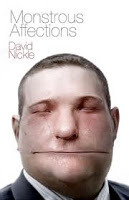 So, too, does David Nickle, busting through the gate with two (2!) novels from Chizine (best genre publisher working today) that have completely floored me with their verve, originality, and utter command of story. I admit to not having yet read his short story collection
Monstrous Affections
, but I have no doubt it will continue Nickle's streak. His novel Eutopia is a gloriously original American historical horror, and his follow-up Rasputin's Bastards is a bold and disturbing Russian epic spy thriller that takes drastically disparate elements (there are echoes of James Bond, John le Carré, China Mieville, and Simmons' Carrion Comfort) and mashes them together in a fantastical narrative that crosses POVs and dimensions with an assurance that is staggering.
So, too, does David Nickle, busting through the gate with two (2!) novels from Chizine (best genre publisher working today) that have completely floored me with their verve, originality, and utter command of story. I admit to not having yet read his short story collection
Monstrous Affections
, but I have no doubt it will continue Nickle's streak. His novel Eutopia is a gloriously original American historical horror, and his follow-up Rasputin's Bastards is a bold and disturbing Russian epic spy thriller that takes drastically disparate elements (there are echoes of James Bond, John le Carré, China Mieville, and Simmons' Carrion Comfort) and mashes them together in a fantastical narrative that crosses POVs and dimensions with an assurance that is staggering.
Have I got your attention yet? Good. Because David Nickle is that good.
Please note: the following comes mostly from memory, as I don't have the books on me at present. So, no quotations.
Eutopia (subtitled A Novel of Terrible Optimism) is ostensibly a historical drama, set in a small isolated mill town in Idaho in 1911. The town, Eliada, is idyllic, with no bars, no vice, and no outward strife. It is, indeed, an experiment in social control, led by a powerful businessman who dreams of his own Utopia. But as must happen in such tales as these, deep evil lies in the woods beyond, evil in unsettlingly lovecraftian forms, evil that recalls the fairy tales of the Brothers Grimm at their most grimmest.
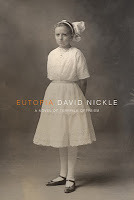 Into this simmering tempest Nickle throws a young man who has mysteriously survived a plague, and a black doctor who knows all too well how flawed Eliada really is. As they hurry to understand what is really happening beneath the idyll (shades of David Lynch), Nickle elegantly weaves themes of faith versus science, man versus man, and nature versus all, and no fair telling who wins, if you can call it winning.
Into this simmering tempest Nickle throws a young man who has mysteriously survived a plague, and a black doctor who knows all too well how flawed Eliada really is. As they hurry to understand what is really happening beneath the idyll (shades of David Lynch), Nickle elegantly weaves themes of faith versus science, man versus man, and nature versus all, and no fair telling who wins, if you can call it winning.
As Nickle pulls the strings of his dizzying array of characters, his plot leaps from period western to redneck horror to magic realism, all without stumbling or missing a beat. This is dark, weird fiction that follows a logic all its own, pulling out all the stops in raising the creepy quotient, yet cementing the bizarre goings-on in characters who pull you along.
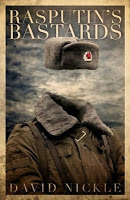 Rasputin's Bastards
is an almost complete about-face (again, shades of Simmons). Nickle now delves into Cold War espionage territory, this time in a tale replete with guns, adventure, and of course, telepathic Russian spies bred in a secret facility. Sent underground after the war ended, the telepaths use their vast powers for their own means, while their young progeny find themselves being diverted against their will to an unusual location.
Rasputin's Bastards
is an almost complete about-face (again, shades of Simmons). Nickle now delves into Cold War espionage territory, this time in a tale replete with guns, adventure, and of course, telepathic Russian spies bred in a secret facility. Sent underground after the war ended, the telepaths use their vast powers for their own means, while their young progeny find themselves being diverted against their will to an unusual location.
Rasputin, like Eutopia, is not a novel easy summarized. Nickle seems to delight in keeping the reader off-balance, easily achieved when half the novel is set in various fantastic mindscapes that continually weave in and out of conscious reality, creating a novel wherein the reader is perpetually on edge and unsure exactly where any single point of the narrative is set. If you are looking for an easy read a la James Patterson, stay far away: if you find China Mieville's expert world-building to be enthralling stuff, you'll have quite a time here.
And there are some squid present, in case you get bored.
Look, by now you can tell what kind of books these are, and whether you're interested. Genre fiction will always suffer the sniffs of snobs (lest you think otherwise, I'm a snob too, can't be bothered with romance, and Tolkienesque ogre opuses leave me cold [plus, did you read that Patterson snub in the previous paragraph?]). Nickle isn't writing for the cheap seats; he's unapologetic about writing for the front row, the elites, the ones who "get it."
Get it? Like Simmons, you can't rush headlong in to Nickle's work, you need a base to draw experiences from. Read your King, bone up on your Shelley, devour your Barker and Lovecraft and Poe and Bloch and Howard.
Then, move on up, and know that you've earned your right to take a ride.
So sayeth the monkey.
You must be this intelligent to enter.
So says the monkey, your highly-trained carnie for this carousel of dreams.
____________________________
I can't tell you what a relief it is to be confronted with a "horror" author whom I cannot say reminds me of Stephen King. This is nothing against King, mind you; his style is deeply effective, and there is a reason he has earned so many imitators, consciously or not.
How often, however, can you reach into that well before you cry "Enough!"? It's inevitable that all authors will resemble some other writer in overall style, with the unarguable exception of Kurt Vonnegut, and King's style is just simple enough to tempt new authors who cannot see the masterful effort that underlies the words. So when a novelist comes along that is the first in a long while to evoke pleasure of writers past while at the same time breaking though new territory, I take notice. Nick DiChario brought me new Theodore Sturgeon stories long after the old master had passes away. Gemma Files has channelled Clive Barker in her stunning horror westerns. And now, Canadian author David Nickle has gifted me with new Dan Simmons (not that Simmons is done himself).
Not that Simmons is done, he's still going strong, publishing at least one novel every year. Simmons is a maestro of practically every category of fiction, an author at ease in horror (Summer of Night, Song of Kali), historical fiction (Drood, The Terror), crime (Hard Freeze), and science fiction (the immortal Hyperion, among many others). He dances through genres like no one since Joe R. Lansdale (still going as well), and he continually brings a new perspective to every genre he touches.
 So, too, does David Nickle, busting through the gate with two (2!) novels from Chizine (best genre publisher working today) that have completely floored me with their verve, originality, and utter command of story. I admit to not having yet read his short story collection
Monstrous Affections
, but I have no doubt it will continue Nickle's streak. His novel Eutopia is a gloriously original American historical horror, and his follow-up Rasputin's Bastards is a bold and disturbing Russian epic spy thriller that takes drastically disparate elements (there are echoes of James Bond, John le Carré, China Mieville, and Simmons' Carrion Comfort) and mashes them together in a fantastical narrative that crosses POVs and dimensions with an assurance that is staggering.
So, too, does David Nickle, busting through the gate with two (2!) novels from Chizine (best genre publisher working today) that have completely floored me with their verve, originality, and utter command of story. I admit to not having yet read his short story collection
Monstrous Affections
, but I have no doubt it will continue Nickle's streak. His novel Eutopia is a gloriously original American historical horror, and his follow-up Rasputin's Bastards is a bold and disturbing Russian epic spy thriller that takes drastically disparate elements (there are echoes of James Bond, John le Carré, China Mieville, and Simmons' Carrion Comfort) and mashes them together in a fantastical narrative that crosses POVs and dimensions with an assurance that is staggering.Have I got your attention yet? Good. Because David Nickle is that good.
Please note: the following comes mostly from memory, as I don't have the books on me at present. So, no quotations.
Eutopia (subtitled A Novel of Terrible Optimism) is ostensibly a historical drama, set in a small isolated mill town in Idaho in 1911. The town, Eliada, is idyllic, with no bars, no vice, and no outward strife. It is, indeed, an experiment in social control, led by a powerful businessman who dreams of his own Utopia. But as must happen in such tales as these, deep evil lies in the woods beyond, evil in unsettlingly lovecraftian forms, evil that recalls the fairy tales of the Brothers Grimm at their most grimmest.
 Into this simmering tempest Nickle throws a young man who has mysteriously survived a plague, and a black doctor who knows all too well how flawed Eliada really is. As they hurry to understand what is really happening beneath the idyll (shades of David Lynch), Nickle elegantly weaves themes of faith versus science, man versus man, and nature versus all, and no fair telling who wins, if you can call it winning.
Into this simmering tempest Nickle throws a young man who has mysteriously survived a plague, and a black doctor who knows all too well how flawed Eliada really is. As they hurry to understand what is really happening beneath the idyll (shades of David Lynch), Nickle elegantly weaves themes of faith versus science, man versus man, and nature versus all, and no fair telling who wins, if you can call it winning.As Nickle pulls the strings of his dizzying array of characters, his plot leaps from period western to redneck horror to magic realism, all without stumbling or missing a beat. This is dark, weird fiction that follows a logic all its own, pulling out all the stops in raising the creepy quotient, yet cementing the bizarre goings-on in characters who pull you along.
 Rasputin's Bastards
is an almost complete about-face (again, shades of Simmons). Nickle now delves into Cold War espionage territory, this time in a tale replete with guns, adventure, and of course, telepathic Russian spies bred in a secret facility. Sent underground after the war ended, the telepaths use their vast powers for their own means, while their young progeny find themselves being diverted against their will to an unusual location.
Rasputin's Bastards
is an almost complete about-face (again, shades of Simmons). Nickle now delves into Cold War espionage territory, this time in a tale replete with guns, adventure, and of course, telepathic Russian spies bred in a secret facility. Sent underground after the war ended, the telepaths use their vast powers for their own means, while their young progeny find themselves being diverted against their will to an unusual location.Rasputin, like Eutopia, is not a novel easy summarized. Nickle seems to delight in keeping the reader off-balance, easily achieved when half the novel is set in various fantastic mindscapes that continually weave in and out of conscious reality, creating a novel wherein the reader is perpetually on edge and unsure exactly where any single point of the narrative is set. If you are looking for an easy read a la James Patterson, stay far away: if you find China Mieville's expert world-building to be enthralling stuff, you'll have quite a time here.
And there are some squid present, in case you get bored.
Look, by now you can tell what kind of books these are, and whether you're interested. Genre fiction will always suffer the sniffs of snobs (lest you think otherwise, I'm a snob too, can't be bothered with romance, and Tolkienesque ogre opuses leave me cold [plus, did you read that Patterson snub in the previous paragraph?]). Nickle isn't writing for the cheap seats; he's unapologetic about writing for the front row, the elites, the ones who "get it."
Get it? Like Simmons, you can't rush headlong in to Nickle's work, you need a base to draw experiences from. Read your King, bone up on your Shelley, devour your Barker and Lovecraft and Poe and Bloch and Howard.
Then, move on up, and know that you've earned your right to take a ride.
So sayeth the monkey.
Published on June 12, 2012 15:33
June 5, 2012
The monkey also watches films. Way too many films.
Again and again, I find myself wanting to update the blog with something, but work, home projects, writing, strife abroad, it all combines to completely exhaust me.
So, in an effort to catch up, I thought I'd direct your attention to the lovely critical cinema website Flick Attack (its motto: hitting you with one random movie a day...whether you like it or not) where yours truly blows off some steam in snack-sized chunklets of movie reviews.
Here, then, are some excerpts from my blisteringly unfocused rants and raves for your reading pleasure, if not your viewing:
Jonah Hex (2010)
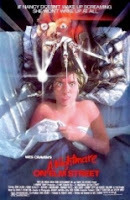 What should have been a pulpy Western mesh of
Blade
and
Pale Rider
is a flat-out disaster, actually making
Wild Wild West
seem not so bad in retrospect (that armored spider was pretty cool).A Nightmare on Elm Street (1984)
What should have been a pulpy Western mesh of
Blade
and
Pale Rider
is a flat-out disaster, actually making
Wild Wild West
seem not so bad in retrospect (that armored spider was pretty cool).A Nightmare on Elm Street (1984)
I am unconvinced that Wes Craven is a great horror director. I’m not honestly sure he’s even a good one.The Thing (2011)
It’s obvious that the people behind The Thing remake studied John Carpenter’s gruesome masterpiece before they began their prequel. But studying ain’t the same as mastering; while Thing 2011 plays the same notes as Thing 1982, there’s barely any music to be heard.MacGruber (2010)
MacGruber is a textbook example of the smart-stupid, the type of stupid only very smart people can create. Thank God that Adam Sandler and Dennis Dugan never got their paws anywhere near this one.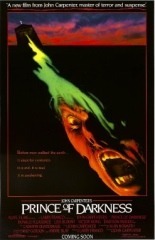 Prince of Darkness (1987)
Prince of Darkness (1987)
Right smack in the middle, a religious tome reveals that Jesus Christ was an extra-terrestrial who tried to warn humans about the dangers inherent in the liquid, and no one bats an eye. That is some cold analytic shit happening right there.Dolan's Cadillac (2009)
In the no man’s land of direct-to-video fare, you get Slater, the poor man’s Jack Nicholson, hardly an untalented actor but hopelessly miscast in portraying such devastating evil. Drive Angry (2011)
Here’s what I want in a movie titled Drive Angry : anger, and driving. When Nicolas Cage is your hero, I’d think the anger would have been covered, but in a role that demands Wild at Heart Cage, or even Face/Off Cage, he gives us Bangkok Dangerous Cage. Dune (1984)
Dune (1984)
Here is why I love Dune : It doesn’t work. Not as a drama. Not as a space opera. Not as a war movie. By the basic tenets of comprehensible storytelling, it’s ridiculous. Its overall failure is legendary. But taken as a whole, it’s a twisted dream, rife with spectacularly unique imagery and a baroque, Flash Gordon -like design that never fails to draw me in, even while I’m picking it apart.Hobo With a Shotgun (2011)
There isn’t one area on the human body that isn’t brutalized in Hobo’s 86 minutes; there isn’t one obscenity in the English language unmuttered; there isn’t one depravity unseen. But you also get a surprising amount of flair.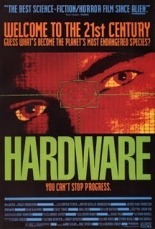 Point Blank (1998)
Point Blank (1998)
What follows are scenes of action so inept, they are tailor-made for YouTube clips. And, yes, the filmmakers honestly expect us to believe that the slab of greased ham that is Rourke is backflipping his way out of Danny Trejo’s line of fire.Hardware (1990)
Hardware is seemingly designed solely for genre snobs who can glimpse genuine artistry poking out from between the seams. Part spaghetti Western, part Terminator and part slasher, if you dig the style, you’ll likely groove to the nihilistic audacity. If not, you’ll find it a heap of gory nonsense.So, yeah, my movie tastes and literary tastes are wildly divergent. And yes, I praise Dune for being incoherent, and condemn Point Blank for being incoherent. But such is the strange schizophrenic nature of my existence.
So, in an effort to catch up, I thought I'd direct your attention to the lovely critical cinema website Flick Attack (its motto: hitting you with one random movie a day...whether you like it or not) where yours truly blows off some steam in snack-sized chunklets of movie reviews.
Here, then, are some excerpts from my blisteringly unfocused rants and raves for your reading pleasure, if not your viewing:
Jonah Hex (2010)
 What should have been a pulpy Western mesh of
Blade
and
Pale Rider
is a flat-out disaster, actually making
Wild Wild West
seem not so bad in retrospect (that armored spider was pretty cool).A Nightmare on Elm Street (1984)
What should have been a pulpy Western mesh of
Blade
and
Pale Rider
is a flat-out disaster, actually making
Wild Wild West
seem not so bad in retrospect (that armored spider was pretty cool).A Nightmare on Elm Street (1984)I am unconvinced that Wes Craven is a great horror director. I’m not honestly sure he’s even a good one.The Thing (2011)
It’s obvious that the people behind The Thing remake studied John Carpenter’s gruesome masterpiece before they began their prequel. But studying ain’t the same as mastering; while Thing 2011 plays the same notes as Thing 1982, there’s barely any music to be heard.MacGruber (2010)
MacGruber is a textbook example of the smart-stupid, the type of stupid only very smart people can create. Thank God that Adam Sandler and Dennis Dugan never got their paws anywhere near this one.
 Prince of Darkness (1987)
Prince of Darkness (1987)Right smack in the middle, a religious tome reveals that Jesus Christ was an extra-terrestrial who tried to warn humans about the dangers inherent in the liquid, and no one bats an eye. That is some cold analytic shit happening right there.Dolan's Cadillac (2009)
In the no man’s land of direct-to-video fare, you get Slater, the poor man’s Jack Nicholson, hardly an untalented actor but hopelessly miscast in portraying such devastating evil. Drive Angry (2011)
Here’s what I want in a movie titled Drive Angry : anger, and driving. When Nicolas Cage is your hero, I’d think the anger would have been covered, but in a role that demands Wild at Heart Cage, or even Face/Off Cage, he gives us Bangkok Dangerous Cage.
 Dune (1984)
Dune (1984)Here is why I love Dune : It doesn’t work. Not as a drama. Not as a space opera. Not as a war movie. By the basic tenets of comprehensible storytelling, it’s ridiculous. Its overall failure is legendary. But taken as a whole, it’s a twisted dream, rife with spectacularly unique imagery and a baroque, Flash Gordon -like design that never fails to draw me in, even while I’m picking it apart.Hobo With a Shotgun (2011)
There isn’t one area on the human body that isn’t brutalized in Hobo’s 86 minutes; there isn’t one obscenity in the English language unmuttered; there isn’t one depravity unseen. But you also get a surprising amount of flair.
 Point Blank (1998)
Point Blank (1998)What follows are scenes of action so inept, they are tailor-made for YouTube clips. And, yes, the filmmakers honestly expect us to believe that the slab of greased ham that is Rourke is backflipping his way out of Danny Trejo’s line of fire.Hardware (1990)
Hardware is seemingly designed solely for genre snobs who can glimpse genuine artistry poking out from between the seams. Part spaghetti Western, part Terminator and part slasher, if you dig the style, you’ll likely groove to the nihilistic audacity. If not, you’ll find it a heap of gory nonsense.So, yeah, my movie tastes and literary tastes are wildly divergent. And yes, I praise Dune for being incoherent, and condemn Point Blank for being incoherent. But such is the strange schizophrenic nature of my existence.
Published on June 05, 2012 13:46
May 8, 2012
Tiny Monkey reviews - Red Means Run by Brad Smith
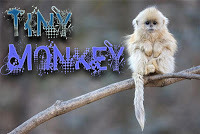 Red Means Run (Simon and Schuster, 2012)by Brad Smith
Red Means Run (Simon and Schuster, 2012)by Brad SmithDescription (from the publisher)
Mickey Dupree is one of the most successful criminal attorneys in upstate New York. The upside of being Mickey: he has never lost a capital murder case. The downside: Mickey has a lot of enemies, and one of them has just driven the shaft of a golf club through his heart, leaving him dead in a sand trap at his exclusive country club.
The cops, led by a gung ho but dim-witted detective named Joe Brady, focus their attentions on Virgil Cain. Just two weeks earlier, Virgil told a crowded bar that “somebody ought to blow Mickey’s head off,” after the slippery lawyer earned an acquittal for Alan Comstock, the man accused of murdering Virgil’s wife. Comstock, a legendary record producer, gun nut, and certifiable lunatic, has returned to his estate, where he lives with his wife, the long-suffering Jane.
Virgil is convinced that the fix is in when Brady immediately throws him into jail with no investigation. So Virgil escapes from custody, determined to find Mickey’s killer himself. His only ally is the smart and sexy Claire Marchand, a detective who is at least willing to consider that Virgil may be telling the truth. Now it’s up to Virgil to prove his innocence, and to do that he needs to find the killer. Before the killer finds him.
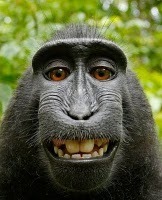 What the Tiny Monkey thinks
What the Tiny Monkey thinks
I think it's still too early to proclaim Brad Smith as Canada's answer to Elmore Leonard; after all, Smith has written only six books, and Leonard has umpteen-million novels and stories behind him. But based on Red Means Run, combined with his past output, it's clear that Smith knows his way around the genre, and has a hell of a lot of fun navigating the terrain.
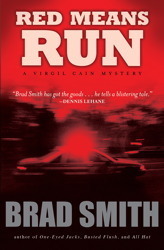 As with Leonard (and the best crime practitioners such as George Pelecanos and Joe R. Lansdale [a genius who straddles genres with ease, and whose Hap Collins and Leonard Pine series is required reading]), Smith understands that a mystery/thriller is really only as good as its characters. From his debut One-Eyed Jacks, Smith has excelled at crafting entertaining low-lifes and underbelly dwellers, and Red Means Run finds him in fine form. Virgil is the crafty sort of protagonist that best propel outlandish plot lines, a fundamentally honest, wryly funny man who is well-nigh incapable of just sitting by and waiting for results. Claire is also nicely nuanced, and while the sexual tension between her and Virgil is never in doubt (on a side note, the cop/criminal sex trope is really played out for me), Smith keeps the banter light even as the plot bobs and weaves its way through murder and mayhem. There's nothing particularly innovative in Smith's approach, but he has the goods to move the story like a motherfu@#er. Red Means Run is pure pleasure to read.
As with Leonard (and the best crime practitioners such as George Pelecanos and Joe R. Lansdale [a genius who straddles genres with ease, and whose Hap Collins and Leonard Pine series is required reading]), Smith understands that a mystery/thriller is really only as good as its characters. From his debut One-Eyed Jacks, Smith has excelled at crafting entertaining low-lifes and underbelly dwellers, and Red Means Run finds him in fine form. Virgil is the crafty sort of protagonist that best propel outlandish plot lines, a fundamentally honest, wryly funny man who is well-nigh incapable of just sitting by and waiting for results. Claire is also nicely nuanced, and while the sexual tension between her and Virgil is never in doubt (on a side note, the cop/criminal sex trope is really played out for me), Smith keeps the banter light even as the plot bobs and weaves its way through murder and mayhem. There's nothing particularly innovative in Smith's approach, but he has the goods to move the story like a motherfu@#er. Red Means Run is pure pleasure to read.TINY MONKEY REALLY LIKES
Published on May 08, 2012 14:20
April 8, 2012
The Last Hiccup - The First Rave
Before I begin a post of unabashed enthusiasm on Christopher Meades' weirdly wonderful new novel
The Last Hiccup
, a note of caution:
Through careful research and self-imposed paranoid fear-mongering, I have determined that Chris, having never met him physically, is undoubtedly one of the following:my doppelganger;my long-lost twin, the one I thought I devoured in utero;a pod person bent on destroying me. Why this belief, Corey, oh master of hyperbole? Take a look, and you tell me I'm freaking out over nothing:

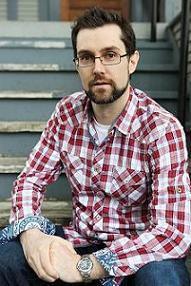
All together now;Meet Corey, who's done most everything, From practice law to plane jumping. But Chris has only stayed the course, He's never even seen a horse. What a crazy pair! 'Cuz they're authors, Identical authors and you'll find, They dress alike, they walk alike, At times they even write alike: You can lose your mind, When authors are two of a kind.
Spooky, no? Maybe it's a coincidence, but I'm afraid to go to sleep at night. Should we meet I have no doubt the universe will cease to exist, or at least suffer a splitting headache.
On the plus side, should I ever die, we have a spare.
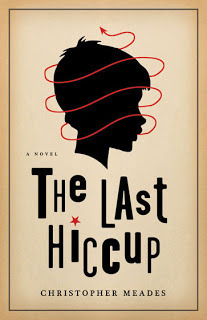 But I come here to praise Chris, not to fear him. I was a fan of his debut novel The ThreeFates of Henrik Nordmark, an unceasingly silly chase novel that gave me no end of pleasure. So when approached, I gladly agreed to blurb his novel (a professional first!), for his sophomore effort The Last Hiccup is everything I look for in a novel; funny, weird, vaguely historical, barely linear, ambiguous, and saturated with synchronous diaphragmatic flutter. Having suffered from a lengthy bout of the devil's esophageal convulsions myself (seven days, no fooling), perhaps I'm inclined to sympathize with Vladimir, the young Russian boy who starts hiccuping at age eight and continues to do so for decades.
But I come here to praise Chris, not to fear him. I was a fan of his debut novel The ThreeFates of Henrik Nordmark, an unceasingly silly chase novel that gave me no end of pleasure. So when approached, I gladly agreed to blurb his novel (a professional first!), for his sophomore effort The Last Hiccup is everything I look for in a novel; funny, weird, vaguely historical, barely linear, ambiguous, and saturated with synchronous diaphragmatic flutter. Having suffered from a lengthy bout of the devil's esophageal convulsions myself (seven days, no fooling), perhaps I'm inclined to sympathize with Vladimir, the young Russian boy who starts hiccuping at age eight and continues to do so for decades.
If the novel were simply that, twenty-plus years of hiccuping, I think I'd have tired of it. Meades, however, takes the Kurt Vonnegut route of torturing the protagonist, placing his hero in early 20th century Russia and submitting him to horrendous ordeal after horrendous ordeal. In short order, Vladimir, a strangely self-possessed little boy, is abandoned by his mother, experimented on by a mad doctor, and sent to live in the mountains with a strange and silent monk. And I haven't even begun to factor World War I into Meades' melange.
I do love a story that never takes me where I expect, and Hiccup certainly fills that bill. It's also extremely clever, dark, surreal, and unexpectedly poignant. I certainly hope Chris continues to push himself into the unexpected, for I sense there are fathoms of fantastic weirdness in him just aching to be discovered.
[NOTE] Should there ever be interest in mine and Chris' life story, perhaps as a Patty Duke-like family comedy with hijinks galore, I hereby submit the following unknown Canadian actor for consideration:
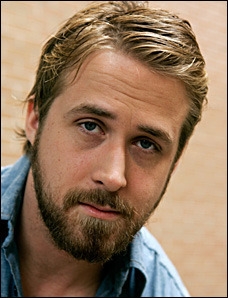 'Cuz they're triplets!Identical triplets, and you'll find,They act alike, they brood alike,Sometimes they're even subdued alike...
'Cuz they're triplets!Identical triplets, and you'll find,They act alike, they brood alike,Sometimes they're even subdued alike...

Through careful research and self-imposed paranoid fear-mongering, I have determined that Chris, having never met him physically, is undoubtedly one of the following:my doppelganger;my long-lost twin, the one I thought I devoured in utero;a pod person bent on destroying me. Why this belief, Corey, oh master of hyperbole? Take a look, and you tell me I'm freaking out over nothing:


All together now;Meet Corey, who's done most everything, From practice law to plane jumping. But Chris has only stayed the course, He's never even seen a horse. What a crazy pair! 'Cuz they're authors, Identical authors and you'll find, They dress alike, they walk alike, At times they even write alike: You can lose your mind, When authors are two of a kind.
Spooky, no? Maybe it's a coincidence, but I'm afraid to go to sleep at night. Should we meet I have no doubt the universe will cease to exist, or at least suffer a splitting headache.
On the plus side, should I ever die, we have a spare.
 But I come here to praise Chris, not to fear him. I was a fan of his debut novel The ThreeFates of Henrik Nordmark, an unceasingly silly chase novel that gave me no end of pleasure. So when approached, I gladly agreed to blurb his novel (a professional first!), for his sophomore effort The Last Hiccup is everything I look for in a novel; funny, weird, vaguely historical, barely linear, ambiguous, and saturated with synchronous diaphragmatic flutter. Having suffered from a lengthy bout of the devil's esophageal convulsions myself (seven days, no fooling), perhaps I'm inclined to sympathize with Vladimir, the young Russian boy who starts hiccuping at age eight and continues to do so for decades.
But I come here to praise Chris, not to fear him. I was a fan of his debut novel The ThreeFates of Henrik Nordmark, an unceasingly silly chase novel that gave me no end of pleasure. So when approached, I gladly agreed to blurb his novel (a professional first!), for his sophomore effort The Last Hiccup is everything I look for in a novel; funny, weird, vaguely historical, barely linear, ambiguous, and saturated with synchronous diaphragmatic flutter. Having suffered from a lengthy bout of the devil's esophageal convulsions myself (seven days, no fooling), perhaps I'm inclined to sympathize with Vladimir, the young Russian boy who starts hiccuping at age eight and continues to do so for decades.If the novel were simply that, twenty-plus years of hiccuping, I think I'd have tired of it. Meades, however, takes the Kurt Vonnegut route of torturing the protagonist, placing his hero in early 20th century Russia and submitting him to horrendous ordeal after horrendous ordeal. In short order, Vladimir, a strangely self-possessed little boy, is abandoned by his mother, experimented on by a mad doctor, and sent to live in the mountains with a strange and silent monk. And I haven't even begun to factor World War I into Meades' melange.
I do love a story that never takes me where I expect, and Hiccup certainly fills that bill. It's also extremely clever, dark, surreal, and unexpectedly poignant. I certainly hope Chris continues to push himself into the unexpected, for I sense there are fathoms of fantastic weirdness in him just aching to be discovered.
[NOTE] Should there ever be interest in mine and Chris' life story, perhaps as a Patty Duke-like family comedy with hijinks galore, I hereby submit the following unknown Canadian actor for consideration:
 'Cuz they're triplets!Identical triplets, and you'll find,They act alike, they brood alike,Sometimes they're even subdued alike...
'Cuz they're triplets!Identical triplets, and you'll find,They act alike, they brood alike,Sometimes they're even subdued alike...
Published on April 08, 2012 12:28
April 5, 2012
Tiny Monkey Reviews - Triggers by Robert J. Sawyer
 Triggers (Penguin, 2012)by Robert J. Sawyer
Triggers (Penguin, 2012)by Robert J. SawyerDescription (from the publisher)
A new mind-bending novel from Canada's leading futurist
On the eve of a secret military operation, an assassin's bullet strikes U.S. President Seth Jerrison. He is rushed to hospital, where surgeons struggle to save his life. At the same hospital, Canadian researcher Dr. Ranjip Singh is experimenting with a device that can erase traumatic memories. Then a terrorist bomb detonates. In the operating room, the president suffers cardiac arrest. He has a near-death experience—but the memories that flash through Jerrison's mind are not his memories.
It quickly becomes clear that the electromagnetic pulse generated by the bomb amplified and scrambled Dr. Singh's equipment, allowing a random group of people to access one another's minds. And now one of those people has access to the president's memories—including classified information regarding an upcoming military mission, which, if revealed, could cost countless lives. But the task of determining who has switched memories with whom is a daunting one, particularly when some of the people involved have reasons to lie ...
 What the Tiny Monkey thinks
What the Tiny Monkey thinks
I have to put some cards on the table up front: not only do I know Rob Sawyer, not only do I like Rob Sawyer, not only do I bring up the fact that I know and like Rob Sawyer at every opportunity; on top of that, one of the characters in Triggers, Eric Redekop, shares my last name. No mere coincidence this, as Rob confirmed via Facebook that he thought my last name was "cool." This FB message has thereby been printed out and framed, verifiable proof that someone likes the damnable moniker. And this also means that, likely for the first time ever, a Mennonite headlines a sci-fi novel, with the possible exception of Robert A. Heinlein's The Froeses of Mars.
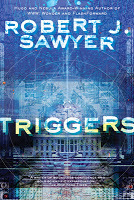 So take this review with salt and imitation buttered popcorn, if you must; Triggers is a lot of fun. Sawyer has never been the greatest of prose stylists, but his enthusiasm for his topics, his hearty dollops of research, and his genuine upbeat attitude (an increasing rarity in science fiction) make the best of his work a pleasure to read (particularly his short stories: I cannot recommend
Iterations
or
Identity Theft
highly enough). Triggers, like most of Sawyer's work, sets its narrative around an immensely intriguing hook, and his plot machinations concerning selective telepathic powers keep the pages flying by. It isn't the deepest of reads, and part of me wishes he went further with his ultimate finale, when the plot ventures into Theodore Sturgeon territory (I won't be divulging this ending here, however; unlike a certain reviewer in the Globe and Mail, I try not to give away the ending whether or not I liked the book). I am unsure whether Triggers qualifies as Sawyer's most fanciful work, as the science behind his scenario sounds fairly wonky to the layperson in me, but that hardly counts as a disqualification. Triggers is fast and fun, with just enough inherent plausibility to the shenanigans to keep me glued to my seat.
So take this review with salt and imitation buttered popcorn, if you must; Triggers is a lot of fun. Sawyer has never been the greatest of prose stylists, but his enthusiasm for his topics, his hearty dollops of research, and his genuine upbeat attitude (an increasing rarity in science fiction) make the best of his work a pleasure to read (particularly his short stories: I cannot recommend
Iterations
or
Identity Theft
highly enough). Triggers, like most of Sawyer's work, sets its narrative around an immensely intriguing hook, and his plot machinations concerning selective telepathic powers keep the pages flying by. It isn't the deepest of reads, and part of me wishes he went further with his ultimate finale, when the plot ventures into Theodore Sturgeon territory (I won't be divulging this ending here, however; unlike a certain reviewer in the Globe and Mail, I try not to give away the ending whether or not I liked the book). I am unsure whether Triggers qualifies as Sawyer's most fanciful work, as the science behind his scenario sounds fairly wonky to the layperson in me, but that hardly counts as a disqualification. Triggers is fast and fun, with just enough inherent plausibility to the shenanigans to keep me glued to my seat.TINY MONKEY REALLY LIKES
Published on April 05, 2012 14:00
March 13, 2012
Tiny monkey - Natural Order by Brian Francis
 Natural Order (Random House, 2011)by Brian Francis Description (from the publisher)
Natural Order (Random House, 2011)by Brian Francis Description (from the publisher)Joyce Sparks has lived the whole of her 86 years in the small community of Balsden, Ontario. "There isn't anything on earth you can't find your own backyard," her mother used to say, and Joyce has structured her life accordingly. Today, she occupies a bed in what she knows will be her final home, a shared room at Chestnut Park Nursing Home where she contemplates the bland streetscape through her window and tries not to be too gruff with the nurses.
This is not at all how Joyce expected her life to turn out. As a girl, she'd allowed herself to imagine a future of adventure in the arms of her friend Freddy Pender, whose chin bore a Kirk Douglas cleft and who danced the cha-cha divinely. Though troubled by the whispered assertions of her sister and friends that he was "fruity," Joyce adored Freddy for all that was un-Balsden in his flamboyant ways. Years later, Joyce married Charlie, a kind and reserved man who could hardly be less like Freddy. They married with little fanfare and she bore one son, John. Though she did love Charlie, Joyce often caught herself thinking about Freddy, buying Hollywood gossip magazines in hopes of catching a glimpse of his face. Meanwhile, she was growing increasingly alarmed about John's preference for dolls and kitchen sets.
Today, as her life ebbs away at Chestnut Park, Joyce ponders the terrible choices she made as a mother and wife and doubts that she can be forgiven, or that she deserves to be.
Voiced by an unforgettable and heartbreakingly flawed narrator, Natural Order is a masterpiece of empathy, a wry and tender depiction of the end-of-life remembrances and reconciliations that one might undertake when there is nothing more to lose, and no time to waste.

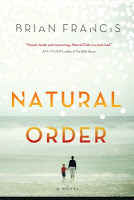 What the Tiny Monkey thinks
What the Tiny Monkey thinks
I usually approach novels set up as "remembrances of things past" with high caution. There's a certain sameness to the form I find off-putting, as the elderly protagonist looks back at the mistakes in life and either a) bemoans cruel fate, or b) comes to terms with the vagaries of existence. Perhaps it's because I was forced (yes, forced!) to read Margaret Laurence's The Stone Angel in school (twice!) well before I was primed to appreciate it that I dislike the subgenre so fervently. I've never gone back to Laurence's book, and despite its sterling reputation, I stand by my teenage opinion that it's about an old woman who was mean to everyone, and then died, and I was glad of it. (Next week; my issues with Pride and Prejudice : hidden feminist classic, or claptrap as boring as a sack of doilies?)
Nevertheless, I dive into the pages of Brian Francis' follow-up to his best-seller Fruit , and find myself quickly and completely under his spell. Natural Order is not a game-changer, but it is a subtle portrait of a woman who could not help herself but try to do what she thought was right even when the outcome was hurtful. Joyce is not a selfish person in most respects, but her selfish refusal to see what her son actually is leads to family dysfunction and eventual unhappiness. Francis may stumble occasionally with some plot contrivances, but his overall sense of the character is riveting, and his refusal to go maudlin is to be congratulated. I truly enjoyed Fruit, but Natural Order is of a new level altogether, far more layered and affecting, the blossoming of a truly fine author.
TINY MONKEY REALLY LIKES
Published on March 13, 2012 15:45
February 26, 2012
Tiny monkey - The Dead Kid Detective Agency
 The Dead Kid Detective Agency (ECW Press, 2011)by Evan MundayDescription (from the publisher)
The Dead Kid Detective Agency (ECW Press, 2011)by Evan MundayDescription (from the publisher)Thirteen-year-old October Schwartz is new in town, short on friends, and the child of a clinically depressed science teacher. Naturally, she spends most of her time in the Sticksville Cemetery, which just happens to border her backyard. And that backyard just happens to be the home of five dead teenagers, each from a different era of the past: there's the dead United Empire Loyalist! The dead escaped slave who made her way north via the Underground Railroad! The dead quintuplet!
Soon, October befriends the five dead kids. Together — using October's smarts and the dead kids' abilities to walk through walls and get around undetected and stuff — they form The Dead Kid Detective Agency, committed to solving Sticksville's most mysterious mysteries. October's like Nancy Drew, if she'd hung out with corpses.
When Sticksville Central High School's beloved French teacher dies in a suspicious car accident, it provides the agency with its first bona fide case. Soon October and her five dead friends find themselves in the midst of a nefarious murder plot, thick with car chases, cafeteria fights, sociopathic math teachers, real estate appointments, and a wacky adventure that might uncover the truth about a bomb that exploded almost 40 years ago.
 What the Tiny Monkey thinks
What the Tiny Monkey thinks
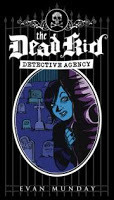 Look, I ain't a kid no mores, see? I don't whitewash fences for nickels and a smile, I don't mow lawns 'cuz my Dad sez it ain't gonna cut itself, I don't go to school to gets me some of that fancy book-learning. But I do, on occasion, read YA. Perhaps its the latent librarian in me, but sometimes it's refreshing to read for a different age bracket. Like adult fiction, the quality varies, from the sublime highs of The Golden Compass to the doltish lows of Twilight. Author and illustrator (and genius publicist for Coach House Press) Evan Munday aims for the highs, and although The Dead Kid Detective Agency does not transcend the genre, it is an enjoyably sardonic adventure with an appealing lead and a surprising trek into a violent chapter in Canadian history. October (wonderful name) is a primo heroine, resourceful, slightly demented, and unafraid of ghosts, murderers, or, worse than both, stuck-up teenage girls (is anything more terrifying than a fifteen-year-old girl with a sense of entitlement?). Her home life is remarkably unvarnished; I can't recall any similar books where a parent is clinically depressed and another has simply run off in the night. It's the realism of these details which help ground the more fantastical elements, and if the plot occasionally careens off the rails, Munday's dry sarcasm and weird asides keep the narrative hopping. His style reminds me of Sean Cullen's Monty Pythonesque writing voice in the
Hamish X
series (check it out!), but Munday has a firmer grasp of character, and is less prone to leaving the plot altogether for the sake of an admittedly funny witticism. There is certainly enough in Sticksville to keep the series going, as Munday promises, and I hope October will get a few more chances to shine.
Look, I ain't a kid no mores, see? I don't whitewash fences for nickels and a smile, I don't mow lawns 'cuz my Dad sez it ain't gonna cut itself, I don't go to school to gets me some of that fancy book-learning. But I do, on occasion, read YA. Perhaps its the latent librarian in me, but sometimes it's refreshing to read for a different age bracket. Like adult fiction, the quality varies, from the sublime highs of The Golden Compass to the doltish lows of Twilight. Author and illustrator (and genius publicist for Coach House Press) Evan Munday aims for the highs, and although The Dead Kid Detective Agency does not transcend the genre, it is an enjoyably sardonic adventure with an appealing lead and a surprising trek into a violent chapter in Canadian history. October (wonderful name) is a primo heroine, resourceful, slightly demented, and unafraid of ghosts, murderers, or, worse than both, stuck-up teenage girls (is anything more terrifying than a fifteen-year-old girl with a sense of entitlement?). Her home life is remarkably unvarnished; I can't recall any similar books where a parent is clinically depressed and another has simply run off in the night. It's the realism of these details which help ground the more fantastical elements, and if the plot occasionally careens off the rails, Munday's dry sarcasm and weird asides keep the narrative hopping. His style reminds me of Sean Cullen's Monty Pythonesque writing voice in the
Hamish X
series (check it out!), but Munday has a firmer grasp of character, and is less prone to leaving the plot altogether for the sake of an admittedly funny witticism. There is certainly enough in Sticksville to keep the series going, as Munday promises, and I hope October will get a few more chances to shine.TINY MONKEY REALLY LIKES
Published on February 26, 2012 09:55
February 12, 2012
Favourite monkey #2
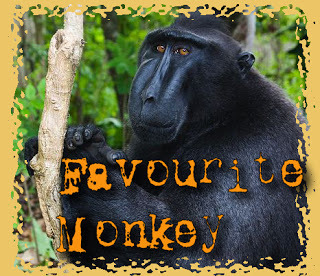 wherein the shelf monkey continues to peruse his vast library for those works of fiction that have tickled his funny bone, goosed his cochlea, frightened his liver, or in some way achieved some sort of response from some area of his anatomy.i.e. the monkey's favourite books this far in his short life. and what excites the monkey today? A good old-fashioned mind-job.Today's intriguing instalment:
wherein the shelf monkey continues to peruse his vast library for those works of fiction that have tickled his funny bone, goosed his cochlea, frightened his liver, or in some way achieved some sort of response from some area of his anatomy.i.e. the monkey's favourite books this far in his short life. and what excites the monkey today? A good old-fashioned mind-job.Today's intriguing instalment:
Do Androids Dream of Electric Sheep?
by Philip K. Dick
"The whole experience of empathy is a swindle."
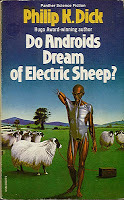 Plot synopsis (from the Official Philip K. Dick website):
Plot synopsis (from the Official Philip K. Dick website):By 2021, the World War had killed millions, driving entire species into extinction and sending mankind off-planet. Those who remained coveted any living creature, and for people who couldn't afford one, companies built incredibly realistic simulacrae: horses, birds, cats, sheep. . . They even built humans.Emigrees to Mars received androids so sophisticated it was impossible to tell them from true men or women. Fearful of the havoc these artificial humans could wreak, the government banned them from Earth. But when androids didn't want to be identified, they just blended in.Rick Deckard was an officially sanctioned bounty hunter whose job was to find rogue androids, and to retire them. But cornered, androids tended to fight back, with deadly results.
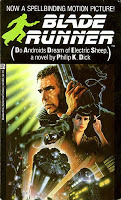 When did the shelf monkey first read this? I read Do Androids Dream of Electric Sheep? (hereinafter DADES?) when I was twelve, the year that the book was commonly known under its cinematic adaptation title
Blade Runner
. Being a huge Harrison Ford fan at the time — still am, although I wish he would take some chances, hook up with Tarantino or Soderbergh, c'mon, man, try something — but being unable to watch the R-rated film due to a mixture of my age and my parents' just crazy unwillingness to sneak me in to the theatre, I had to make do with the book.
When did the shelf monkey first read this? I read Do Androids Dream of Electric Sheep? (hereinafter DADES?) when I was twelve, the year that the book was commonly known under its cinematic adaptation title
Blade Runner
. Being a huge Harrison Ford fan at the time — still am, although I wish he would take some chances, hook up with Tarantino or Soderbergh, c'mon, man, try something — but being unable to watch the R-rated film due to a mixture of my age and my parents' just crazy unwillingness to sneak me in to the theatre, I had to make do with the book.What were the first impressions? DADES? hit me like a tonne of proverbial bricks. My sci-fi knowledge up to that point was confined to the adventures of Tom Swift and John Christopher's Tripod trilogy. Being introduced so young to the thematic complexities of P.K. Dick probably warped me.
How many times has the shelf monkey read this? Estimation? Somewheres in the teens. Possibly even twenty.
Has it withstood the perils of time and maturity? In the name of Mercer, yes.
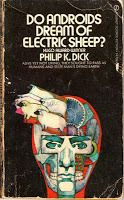 New thoughts: Is it at all strange to claim a work that raises immense levels of despair and existential angst in the reader as a favourite? It feels wrong somehow. 'Favourites' should induce joy and wonderment, not dread, fear, and self-loathing. Nevertheless, there you have it. Id est, quid id est.
New thoughts: Is it at all strange to claim a work that raises immense levels of despair and existential angst in the reader as a favourite? It feels wrong somehow. 'Favourites' should induce joy and wonderment, not dread, fear, and self-loathing. Nevertheless, there you have it. Id est, quid id est.DADES? is one of those novels that reveals more and more every time you read it, exposing new pleasures and forgotten plot points. The movie version keeps pushing the novel to the side in my head, and while it is a superb film, it really isn't the novel. Aside from a few themes and character names, it's barely recognizable from its literary origins.
 Like the movie, DADES? concerns identity, and the increasing loss of it in society. In this instance, a society wherein most of the able-bodied people have fled the planet after World War Terminus, and the citizens who remain are slowly succumbing to the radioactive dust which coats the planet. It is a world where entropy rules, one where every person and thing is turning to the wondrously awful concept of "kipple:"
Like the movie, DADES? concerns identity, and the increasing loss of it in society. In this instance, a society wherein most of the able-bodied people have fled the planet after World War Terminus, and the citizens who remain are slowly succumbing to the radioactive dust which coats the planet. It is a world where entropy rules, one where every person and thing is turning to the wondrously awful concept of "kipple:""Kipple is useless objects, like junk mail or match folders after you use the last match, or gum wrappers or yesterday's homeopape. When nobody's around, kipple reproduces itself. For instance, if you leave any kipple around your apartment, when you wake up the next morning there's twice as much of it. It always gets more and more."While the world yields itself to its kipplization, its citizenry makes do with a variety of mood-altering conveniences. There's the Penfield mood organ — a clear comment on the increasing use of medicines to alleviate states of emotional being — a device wherein the user may dial an appropriate mood to get through the day. Rick Deckard gets through the day by dialing for "a creative and fresh attitude towards his job," and he is horrified when he discovers his wife Iran has dialed herself a six-hour self-accusatory depression. As she explains, explaining one of the novel's leading themes:
"I was in a 382 mood; I had just dialed it. So although I heard the emptiness [in the surrounding apartments] intellectually, I couldn't feel it. My first reaction consisted of being grateful that we could afford a Penfield mood organ. But then I realized how unhealthy it was, sensing the absence of life, not just in this building but everywhere, and not reacting — don't you see? I guess you don't. But that used to be considered a sign of mental illness: then called it 'absence of appropriate affect.' So I left the TV sound off and I sat down at my mood organ and I experimented. And I finally found a setting for despair. So I put it on my schedule for twice a month; I think that's a reasonable amount of time to feel hopeless about everything, about staying here on Earth after everybody who's smart has emigrated, don't you think?"
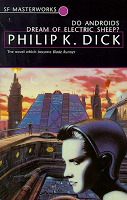 As Deckard works to hunt down and kill the androids that have infiltrated Earth, he undergoes an existential crisis as he begins to empathize with them. In this future, empathy is in short supply, which is a main reason for the rise of Mercerism, a religion that uses a virtual reality linkup with the user to increase their empathy through a metaphorical trek up an endless mountain alongside a very old man. As you trek, stones are hurled from unseen enemies, often leaving the Mercerite bruised and cut, allowing them to become more in tune with the feelings of other. The lack of empathy is a major reason why humanity is seemingly on its last legs, with officials claiming that "Mercerism reduced crime by making citizens more concerned about the plight of their neighbors." This is also why it is considered the height of one's existence to own at least one true animal (most animals being extinct, and people making do with electronic facsimiles). I have in my literary life had few emotional responses as strong as my pity toward Deckard as he uses his bounty money to purchase a real goat; the joy he has, the utter belief that this will make him a better person, is as pathetic and heart-rending a moment as any I've read.
As Deckard works to hunt down and kill the androids that have infiltrated Earth, he undergoes an existential crisis as he begins to empathize with them. In this future, empathy is in short supply, which is a main reason for the rise of Mercerism, a religion that uses a virtual reality linkup with the user to increase their empathy through a metaphorical trek up an endless mountain alongside a very old man. As you trek, stones are hurled from unseen enemies, often leaving the Mercerite bruised and cut, allowing them to become more in tune with the feelings of other. The lack of empathy is a major reason why humanity is seemingly on its last legs, with officials claiming that "Mercerism reduced crime by making citizens more concerned about the plight of their neighbors." This is also why it is considered the height of one's existence to own at least one true animal (most animals being extinct, and people making do with electronic facsimiles). I have in my literary life had few emotional responses as strong as my pity toward Deckard as he uses his bounty money to purchase a real goat; the joy he has, the utter belief that this will make him a better person, is as pathetic and heart-rending a moment as any I've read.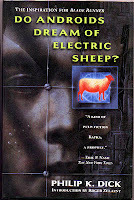 The empathy shortage is also a reason why androids fit in so well. Deckard's investigation leads him to a bizarre subworld of his city where is seems androids have taken over the neighbourhoods, with their own police force. As his quest continues he becomes increasingly depressed, unable to determine the real difference between man and machine.
The empathy shortage is also a reason why androids fit in so well. Deckard's investigation leads him to a bizarre subworld of his city where is seems androids have taken over the neighbourhoods, with their own police force. As his quest continues he becomes increasingly depressed, unable to determine the real difference between man and machine.DADES? is not perfect; there are some plot points that still don't make sense to me, especially Deckard's sudden realization that the Russian policeman he is sitting with is an android. Deckard also obsesses over how hard these new androids will be to track and kill, yet they appear remarkably easy prey.
For me, such moments do not matter. DADES? gets to me like few novels ever have; perhaps it is a flaw in my mindset, an error in my programming, but sometimes I just need to feel bad. Like Iran, sometimes I need to remind myself of the misery of the world, to force myself to accept feelings I don't enjoy. Some may achieve this by reading Kafka, or the plays of Chekov. For me, Do Androids Dream of Electric Sheep? is the cure for my happiness.
Verdict: still a favourite monkey
Published on February 12, 2012 10:50



